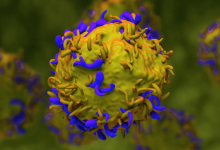Curbside Consults - July 2017 Save

Curbside Consults are cases submitted by our rheumatology colleagues as challenging therapeutic or safety issues. Answers are based on experience, with added evidence from the medical literature and published guidelines.
Case 1JU. Today I saw a new psoriatic arthritis patient who has recently had MRSA infections that included one hospitalization due to MRSA of a knee after cortisone injection knee. The patient is on a DMARD but needs more aggressive therapy – more than bleach baths and prayer. Can she receive a biologic?
- Answer: it is very important to note that when it comes to serious infectious events (SIE), the general rule is that once you have an SIE, you are more likely to have a recurrence of it and that it may be more severe or fatal next time around. Hence, this patient is henceforth, at a greater risk to have either septic arthritis or a repeat MRSA infection. This increased risk is not affected by the therapy you use (it will happen on MTX or on tocilizumab, etc.) unless you are also using high dose steroids or the patient has numerous SIE risk factors. For patients such as this it may be instructive to use the RABBIT SIE Risk Calculator (here). That said, there is no link or direct risk between MRSA and use of TNF inhibitors, other biologics or novel therapies. I would use any or all necessary therapies once the MRSA infection is treated and/or controlled. There is an interesting report from earlier this year showing that the types and factors underlying septic arthritis in rheumatoid arthritis (RA) has evolved from 1979-2013 with more cases of septic arthritis, more biologic use, more polyarticular infections, more MRSA (6% v 31%); but same age, sex, RF+, steroid use and outcomes; including death. (Citation source http://buff.ly/2u6OZTL)
Case 2JU. I have a PsA patient who was successfully treated with Remicade for 6 years, and had to stop 7 months ago when he took BCG therapy for bladder cancer. Is there any literature or advice concerning when to restart Remicade for PsA after the patient has concluded BCG intravessicular therapy?
- Answer: Great question, but I am not sure there is a clear answer. Thus, we would welcome input from anyone who has already gone through this situation. My answer would have been guided by either a urologic guideline or the pharmacokinetic 1/2 life. However, the 1/2 life is unknown and stopping rules on BCG related more to failure than success. BCG is usually given as a 3 week or 6 week course and may be repeated. Whether given as bladder installations or percutaneously, active BCG treatment should never be combined with TNF inhibitor therapy as there is a risk of TB infection. Such risk would be far less if the patient were to receive other non-TNF drugs (e.g., ABA, TCZ, anakinra, RTX, Tofa). I would probably wait a month after being off BCG before restarting Remicade. It may be better to use an alternative biologic and wait several months to see if the new agent works or if you need to return to infliximab therapy. It’s unclear if there is a benefit (or lower risk) to waiting 2 months or more.
Case 3JU. I sent a patient to get Zostavax and Prevnar-13. Pharmacist gave her the Zostavax and told her she must wait a month before allowed to get the Prevnar-13. Also, any update on release date of new shingles vaccine and whether there would be a waiting period if one had the Zostavax previously (like the year between a Pneumovax and Prevnar-13)?
- Answer: At issue here is whether you can give multiple vaccines at the same time and the answer is YES - you can give multiple vaccines together - the military does it all the time with their vaccine gun approach to mass immunization of the militia. Moreover, the Prevnar PI says it can be given together with the flu vaccine (showed noninferiority - see below). The CDC website on vaccines also says multiple vaccines are safe and commonly recommended in children. The new shingles subunit will not be available until 2018 - it will be three shots and may have many constitutional side effects (e.g., myalgias, fever, etc.) and will be more expensive. Yes, it works better and thus may be worth the wait for some. For now, I’m giving the current zoster vaccine to all those eligible and nearly all those going on a JAK inhibitor.
Case 4JU. Can you remind me of what biologics you are comfortable using in patients with nonturberculous mycobacterial (NTM) infections (MAC or MAI)?
- Answer: There are many options for those patients who have MAC/MAI infections. These include abatacept, tofacitinib, rituximab, and tocilizumab. If this occurred in a patients with PsA or SLE I would have no problem using belimumab, rituximab, secukinumab, ixekizumab, ustekinumab, apremilast or the newly approved guselkumab. TNF is needed to form and maintain granulomas, thus anti-TNF therapies are risky in patients with NTM infections that cannot be completely eradicated. Non-TNF therapies are much safer. I would thusly avoid all TNF inhibitors, prednisone and leflunomide. The leflunomide package insert requires PPD testing and has been associated with mycobacterial infections.










If you are a health practitioner, you may Login/Register to comment.
Due to the nature of these comment forums, only health practitioners are allowed to comment at this time.